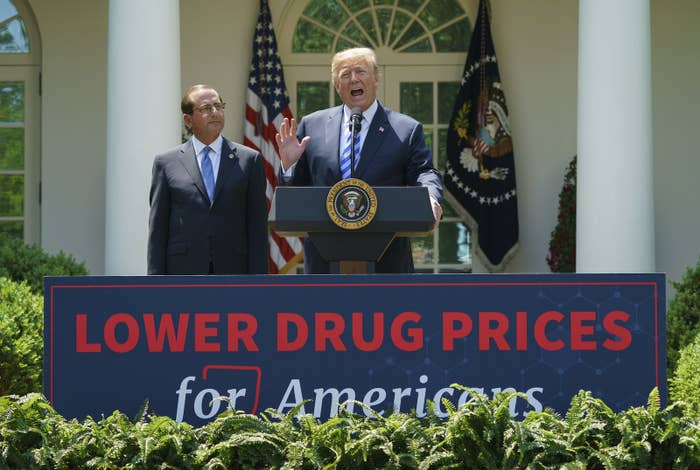
President Donald Trump unveiled his “American Patients First” proposal to lower drug prices on Friday, in a long-awaited speech on an issue he campaigned on.
“We will have tough negotiations, more competition, and much lower drug prices,” said Trump in the speech held at the White House Rose Garden. “Very soon.”
Prescription drugs cost the US some $329 billion in 2016, according to federal estimates. Price hikes — for EpiPens, cancer drugs, and an antiparasitic medication that jumped from $13.75 to $750 per pill — have raised the political profile of the issue.
Need some context for today’s convos about lowering #prescription drug costs? Check out some of the trends in U.S. Rx drug spending. https://t.co/2CauCgfyek https://t.co/bglDawv2D5
The speech comes days after revelations that pharma behemoth Novartis paid Trump’s personal lawyer, Michael Cohen, some $1.2 million last year for access to the president and his administration.
During the presidential campaign, Trump said he would force the government to negotiate lower drug prices. During his presidential transition, he said drug companies were “getting away with murder,” comments that caused panic in the industry.
In his Friday speech, he criticized pharmaceutical industry lobbying, which outmuscles many other industries, and outlined his new “blueprint” for lower drug prices. But Trump stopped short of letting the US government agencies directly negotiate drug prices, including the $675 billion Medicare program. The president described such negotiation as “foreign freeloading” when done overseas, leaving the US with the world’s highest pharmaceutical prices.
Instead, Trump focused on four areas:
—increasing the transparency of drug prices seen in ads and by Medicare patients;
—preventing the manipulation of FDA, Medicaid, and the Affordable Care Act drug quality rules to force cheaper drugs out of patients’ hands;
—promoting lower-cost drugs for Medicare and Medicaid patients;
—and stopping foreign countries from negotiating lower drug prices with pharma, which the administration has argued forces US consumers to pay higher prices.
“We will also demand fairness overseas,” Trump said, noting that some drugs that cost only a few dollars in foreign countries are sold for hundreds of dollars in the US.
Pharmaceutical and biotech industry stocks jumped in response to the speech, reflecting industry relief over the new plan, which calls for Congress to pass laws giving more power to insurers who administer Medicare drug benefits to negotiate better drug prices, a daunting prospect in an election year. Congress now requires Medicare to pay for all prescription drugs approved by the FDA, and most insurers follow Medicare’s example.
Biotechs = way up Pharma = way up https://t.co/Za0tUuhAIQ
Despite Trump's promise for a solution "very soon," others in the administration noted that it's an enormous, complicated problem.
"This doesn't get solved tomorrow," Health and Human Services Secretary Alex Azar said at a White House briefing after the speech. "It is going to take years of restructuring the system."
And some health analysts are critical of Trump’s approach.
“The action plan is too vague. Better negotiation of prices could mean almost anything,” Diana Zuckerman, president of the nonprofit National Center for Health Research, told BuzzFeed News. Focusing on out-of-pocket patient expenses instead of lower prices for the drugs themselves will lead to higher health insurance costs, she said. For example, when drugs cost more than $100,000 per year, as many do now, taxpayers and people buying insurance bear the cost, not just the patients taking the drugs.
"Complaining that foreign countries pay much less for drugs, and they need to pay as much as we do misses the fundamental problem — high drug prices," bioethicist Art Caplan of New York University's Langone Medical Center told BuzzFeed News. "It's completely bizarre."
Earlier this month, Food and Drug Administration Commissioner Scott Gottlieb called for getting rid of secret rebates that pharmaceutical companies privately offer insurers, a practice that allows them to set new drugs prices high and safeguard profits, yet also give discounts to favored customers. The proposal was included as a possible later measure in the Trump blueprint.
